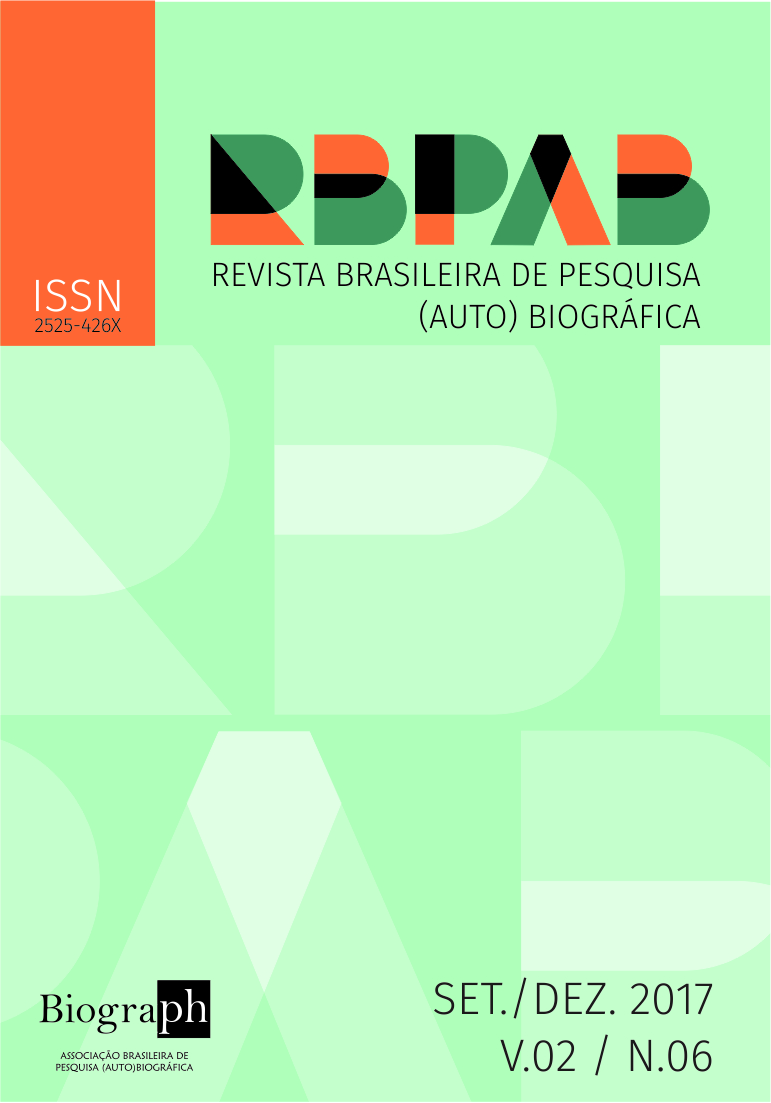Identity, identification and differentiation in contemporary brazilian comedies
DOI:
https://doi.org/10.31892/rbpab2525-426X.2017.v2.n6.p583-595Palavras-chave:
cinema, difference, power of falseResumo
We explore how Deleuze’s notion of the ‘powers of the false’, from Cinema 2, enables a consideration of the ways in which national identity is negotiated in two popular Brazilian comedies of the 2000s, Se Eu Fosse Você/If I Were You (2006) and Se Eu Fosse Você 2/If I Were You 2 (2009). The films offer possibilities for various Brazilian audiences to reimagine national identities “against the grain” of a movement-image blockbuster with an apparently homogenising white, middle class, nuclear family-oriented, normative image of national identity. Studying the aesthetics of these artistic productions, understanding their implications for people and for world representations as structured by the look and its narrative, we found contributions to cultural identities discussions on curriculum studies.
Downloads
Referências
ABREU, Luis Felipe Silveira de; MACEDO, Lennon Pereira; ROSSINI, Miriam de Souza. O filme brasileiro popular contemporâneo: fenômenos de público e modelos estéticos (2002-2012). Intercom – Sociedade Brasileira de Estudos Interdisciplinares da Comunicação XIV Congresso de Ciências da Comunicação na Região Sul. Anais… S. Cruz do Sul - RS – 30/05 a 01/06/2013. p. 1-12.
AHN, Ji-Hyun. Desiring biracial whites: cultural consumption of white mixed-race celebrities in South Korean popular media. Media, Culture & Society, 2015, Vol. 37(6) 937– 947.
BRENNAN, Niall P Brennan. The Brazilian Television Mini-Series: Representing the Culture, Values and Identity of a Nation. A thesis submitted to the Department of Media and Communications of the London School of Economics and Political Science for the degree of Doctor of Philosophy, London, August 2012.
BRENNAN, Niall P. Authority, resistance, and representing national values in the Brazilian television mini-series. Media, Culture & Society. 2015, Vol. 37(5) 686–702.
DELEUZE, Gilles. Diferença e Repetição, trad. Luiz Orlandi and Roberto Machado, 2. ed, Rio de Janeiro, Graal. 2006..
DELEUZE, Gilles. CINEMA 2: The Time Image. Transl. Hugh Tomlinson and Robert Galeta; Univ. Minnesota Press, 1989.
DENNISON, Stephanie; SHAW, Lisa. Popular Cinema in Brazil . Manchester: Manchester University Press, 2004.
GIL, José. A imagem-nua e as pequenas percepções. Estética e Metafenomelogia 2. ed., Lisboa, Relógio D´Água. 2005.
HICKEY-MOODY, Anna. Affect as a method: feelings, aesthetics and affective pedagogy. In: COLEMAN, Rebecca Coleman and RINGROSE, Jessica (ed.). Deleuze and research methodologies. Edinburgh: University Press, 2013.
jagodzinski, jan. "On Cinema as Micropolitical Pedagogy: Is there an Elephant in the Classroom?." In: CARLIN, Matthew; WALLIN, Jason. Deleuze & Guattari, Politics and Education: For a People-Yet-to-Come. New York: Bloomsbury Academic, 2014.
JANKIE, Dudu. When post-colonial critique meets curriculum history. In: BAKER, Bernadette (ed.) New curriculum History. Roterdam/Boston/Taipei: Sense Publishers. 2009.
LAZZARATO, Maurizio. “Machines to Crystallize Time: Bergson”, Teory, Culture & Society. V. 24, n. 6. 2007. p. 93-122.
MARTIN-JONES, David. Deleuze, Cinema and National Identity. Edinburgh: Edinburgh University Press, 2006.
NAGIB, Lúcia. Brazil on Screen. London: I.B. Tauris, 2007.
ORLANDI, Luiz Benedito Lacerda. Deleuze entre o caos e o pensamento. In: AMORIM, A. C R.; OLIVEIRA JR, W. M. Conexões Deleuze e Imagem e Pensamento e ... Petrópolis/RJ: DP et alii, 2011. p. 145-154.
PARENTE, André (ed.) Imagem-Máquina. A era das tecnologias do virtual. São Paulo: Editora 34, 2004.
PINAR, William (ed.). Curriculum Studies in Brazil. Intellectual Histories, Present Circumstances. New York : Palgrave Macmillan, 2011.
REYNOLDS, William M. Cultural Curriculum Studies, Multiplicity, and Cinematic-Machines. Journal of Curriculum Theorizing, v. 22, n. 2, 2006. p. 41-53
SCANNELL, John. The ‘419 Scam’: An Unacceptable ‘Power of the False’?. PORTAL Journal of Multidisciplinary International Studies, vol. 11, no. 2, July 2014. 16 p.
SEVERINO, Tiago Nunes. O seriado brasileiro como estratégia para conquistar o novo público dos canais pagos. temática. Ano XI, n.01 – Janeiro/2015. p. 52-74.
SMITH, Daniel W. Temporality and Truth. Deleuze Studies, Volume 7 Issue 3, Page 377-389. Available Online Jul 2013. p. 385
SPEGLICH, Erica. Duração: entre imagens do Programa Biota/Fapesp. Universidade Estadual de Campinas, Tese de Doutorado (Educação). 2009.
SUTTON, Damian Sutton; MARTIN-JONES, David. Deleuze Reframed. London: I.B. Tauris, 2008.
WALLIN, J. A. Deleuzian approach to curriculum: Essays on a pedagogical life. New York, NY: Palgrave McMillan, 2011.
WUNDER, Alik et alli. “Imagens que acontecem nos deslocamentos em/de pesquisas”, In: I Simpósio Internacional em “Educação e Filosofia”, 2006, Marília, Anais... FFC/Unesp, Marilia, 2006. p. 1-16.
XAVIER, Ismail. ‘Brazilian Cinema in the 1990s’. In: NAGIB, Lúcia (ed.), The New Brazilian Cinema. London: I.B. Tauris, 2003.













































